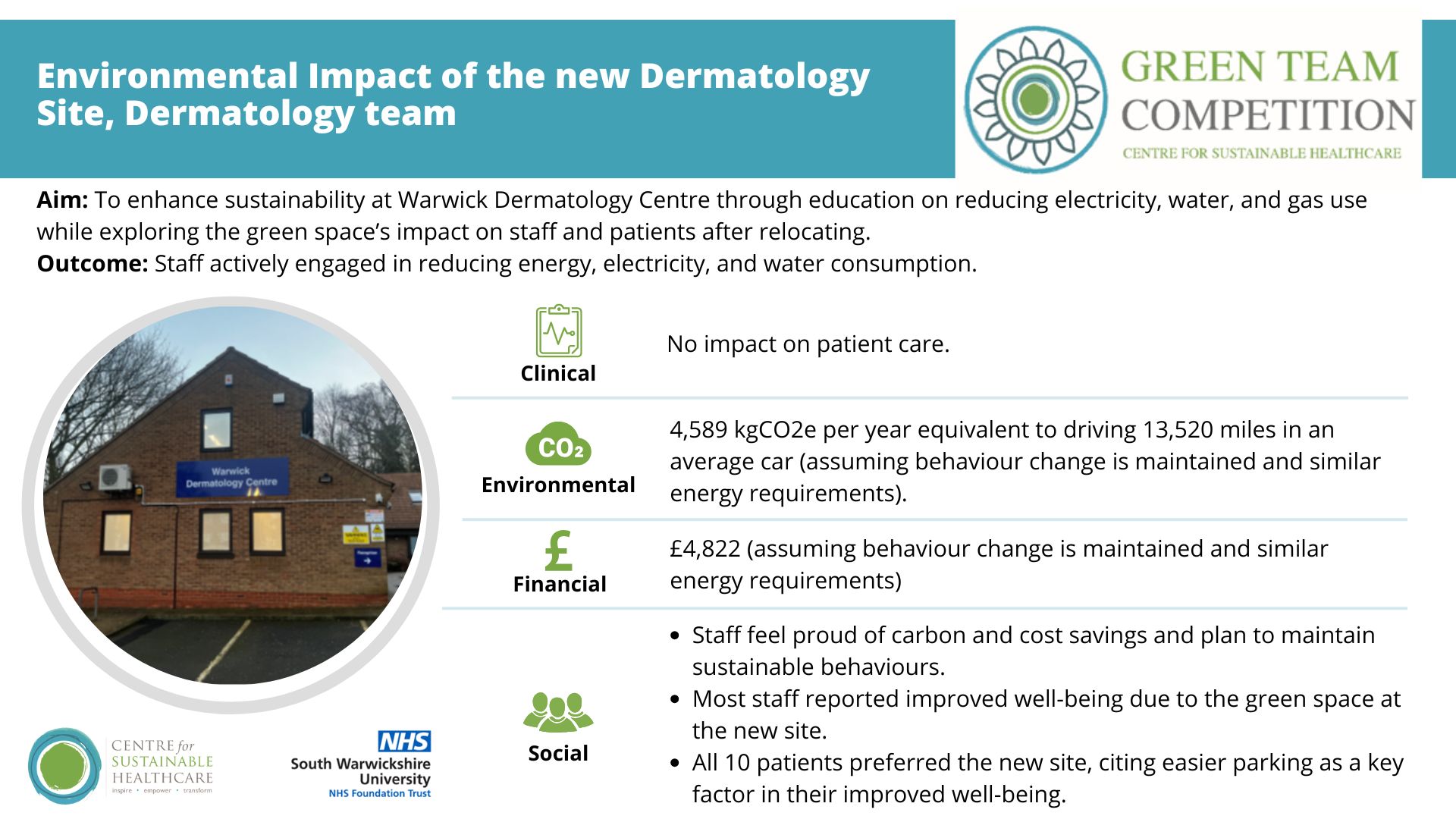Project completed as part of the 2024 Coventry and Warwickshire NHS Integrated Care System Green Team Competition.

Team members:
• Rebecca Grant, Clinical Education Fellow
• Lauren Taylor, Clinical Education Fellow
• Abigail Cooke, Dermatology Fellow
• Simon Tso, Consultant Dermatologist
Setting / patent group: Warwick Dermatology Centre
Issue:
Previously the dermatology department had worked at the main hospital site. The relocation of the dermatology department to a separate site 20 minutes away, allowed us to monitor and reduce our departmental energy (electricity and gas) and water usage. The move, to an area with potentially more green space, also enabled us to assess the impact of this change in working environment on staff and patients.
Intervention:
The intervention had different elements
(1) The implementation of an educational package to reduce the electricity, water and gas usage. This consisted of an email with a PowerPoint presentation that reminded staff to turn off the lights and computers at the wall etc. and to use hand gel instead of washing hands where possible. Water and energy use was measured throughout October 2024 before the intervention, and throughout November 2024, after the intervention.
(2) A survey to establish the change in the amount of green space at the new site versus the main hospital and the impact of the move on both patients and staff. This survey included questions on the impact of the physical environment on psychological wellbeing, frequency of use of green spaces and other questions regarding how the move affected sustainability related actions
(3) an audit of the implementation of more recent melanoma guidance with a reduced carbon footprint.
Outcomes:
- Environmental
Overall, 382.4kgCO2e was saved over the month-long period. Projected across a year, assuming behaviour change is maintained and similar energy requirements, we anticipate annual savings of 4,588.7 kgCO2e, equivalent to driving 13,520 miles in an average car. Most of this saving was attributed to a reduction in electricity usage; the team were able to reduce electricity consumption by a third. Incidentally gas consumption increased from one month to the next.
- Social
We informed the dermatology staff of our overall carbon saving, and they were extremely happy and proud to achieve such a result. They have said that they plan to continue with their sustainable behaviours, especially now they can see the great impact it can have. The staff questionnaire highlighted that most of the staff have felt that the green space has improved their psychological well-being. Almost two thirds of staff were utilising the surrounding areas of green space at least monthly. For most members of staff, the move to the new site did not impact on their mode of transport use but closer parking meant they walked less. All ten of the patients asked preferred the new site, the common theme amongst them was that they found it much easier to find parking and this therefore improved their general wellbeing.
- Clinical
The audit of melanoma treatment found that all patients were being treated under the appropriate guideline and no extra patients could be transitioned to the lower carbon pathway.
- Financial
The overall financial saving for electricity as a result of the implementation of the education package was £390.08/month and the financial saving for water was £16.53/month. There was an overall loss of £4.76/month in energy used for heating e.g. gas. Therefore, overall per annum, assuming staff behaviours and the utilities requirements remain similar, this will result in an overall saving of £4,822.22 (excluding VAT) for the trust.
Key learning point:
A small intervention to encourage electricity reduction can make a big difference, though it might be sensible to measure how this energy consumption changes over time and from month to month.
A fantastic achievement! Great opportunity with the relocation to enable more control and direct assessment of how small interventions can make big differences. The educational package, supported individual's behaviour change which once scaled to the whole team add up! Be great to hear more regarding the low carbon melanoma pathway.
Please log in or sign up to comment.